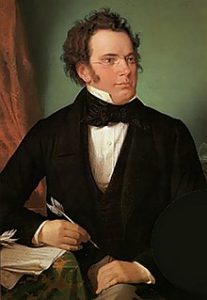
BY NECDET BALKIR GÖKA (ME/IV) balkir.goka@ug.bilkent.edu.tr
“A stranger I arrived, a stranger I depart.”
With these words, the winter journey of a stranger begins. This is the one of the more astonishing moments of classical music. In the late 1820s, composer Franz Schubert’s illness (syphilis) became worse, and he believed that he was near death. The ideas that came to his mind while he was expecting to die were so powerful that he finished many of his masterpieces during this time. We can only imagine Schubert’s feelings while he was awaiting death; and our imagination must be based on those works that expressed his feelings. Among all the pieces he wrote during this period, the one that most clearly conveys his state of mind is the song cycle “Winterreise” (Winter Journey).
In a song cycle, all of the separate songs, or lieder – art songs composed on poems and typically arranged for a single singer and piano accompaniment – are connected to each other and form a unit, so that they are to be performed together in sequence. Although we assume that the songs in “Winterreise” are reflections of Schubert’s feelings, the poems were written by Wilhelm Müller. But the composer’s choice of these particular poems from among so many others shows us that their melancholy lines affected him greatly.

The first song starts with a rhythmic chord progression, like steps on the snow. The traveler begins his journey alone; his only company is his shadow. Why did he start his journey? What we understand from the lyrics, which say, “The girl spoke of love, her mother even of marriage,” is that it was because of love. But each of us could answer this question differently, because the paths of our emotions have been the result of different story lines. As the first lyrics of the third song echo in our ears, the traveler cries out his great depression and rebellion. What he says is incomparably devastating: “My tears… you spring from your source in my breast so burning hot that you should melt a whole winter’s ice!”
In the fifth song, “Der Lindenbaum,” the traveler’s sorrow quiets down as he sits under a lime tree. The lime tree, or linden, is mythologically important for Germans. It was believed that the tree helps to unearth the truth and puts tranquility in one’s soul. The swaying of the lime tree in the wind is portrayed in the fast, complex melody played by the piano, which creates a holy environment. The shadows under the branches of the tree are a place for the traveler to escape from his sorrows. The wind is rustling through the leaves of the tree, saying: “Come here to me, lad, here you will find your rest.”
However, these positive emotions do not last throughout the cycle. As the traveler continues his journey, the sadness in his soul grows exponentially. By the beginning of the second part of the cycle, the traveler has lost his way in the darkness of winter. (It should be noted that the two parts of the cycle were published separately.) Except for small moments expressing bursts of feeling, the second part is darker than the first, because the traveler’s soul becomes more distorted. We see a glimpse of hope in the first song of the second part, “Die Post.” Our traveler suddenly becomes excited when he sees a postman on the road. This excitement is a glimmer of hope in a soul trying to find a branch it can clutch to cling onto life. But the postman dashes the traveler’s hopes, throwing his loneliness back in his face, since there is no letter for him. The final song, “Der Leierman,” is musically the most remarkable song in the whole cycle. The piano plays a repetitive, dark melody. The environment is foggy; the traveler cannot find his way. It is a song about not only his final despair, but also the deterioration of his soul.
Throughout the cycle of 24 songs, the listener becomes the traveler, even without understanding German. The songs are composed in such a way that the feelings expressed in Müller’s lines are transmitted through the vibrations of the singer’s vocal cords and the strings in the piano. It seems to me that such a masterpiece could have been written only if the composer felt the exact same emotions. Therefore, I look at the song cycle “Winterreise” as Schubert’s journey to death.
